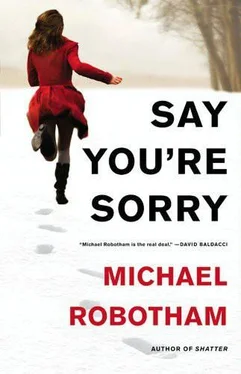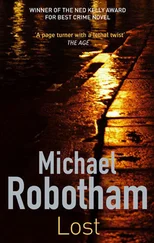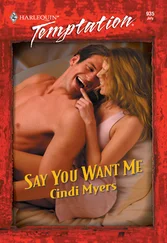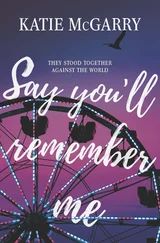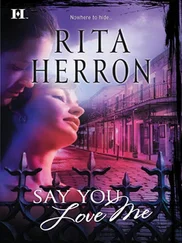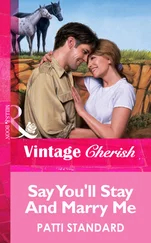Michael Robotham - Say You're sorry
Здесь есть возможность читать онлайн «Michael Robotham - Say You're sorry» весь текст электронной книги совершенно бесплатно (целиком полную версию без сокращений). В некоторых случаях можно слушать аудио, скачать через торрент в формате fb2 и присутствует краткое содержание. Жанр: Триллер, на английском языке. Описание произведения, (предисловие) а так же отзывы посетителей доступны на портале библиотеки ЛибКат.
- Название:Say You're sorry
- Автор:
- Жанр:
- Год:неизвестен
- ISBN:нет данных
- Рейтинг книги:4 / 5. Голосов: 1
-
Избранное:Добавить в избранное
- Отзывы:
-
Ваша оценка:
- 80
- 1
- 2
- 3
- 4
- 5
Say You're sorry: краткое содержание, описание и аннотация
Предлагаем к чтению аннотацию, описание, краткое содержание или предисловие (зависит от того, что написал сам автор книги «Say You're sorry»). Если вы не нашли необходимую информацию о книге — напишите в комментариях, мы постараемся отыскать её.
Say You're sorry — читать онлайн бесплатно полную книгу (весь текст) целиком
Ниже представлен текст книги, разбитый по страницам. Система сохранения места последней прочитанной страницы, позволяет с удобством читать онлайн бесплатно книгу «Say You're sorry», без необходимости каждый раз заново искать на чём Вы остановились. Поставьте закладку, и сможете в любой момент перейти на страницу, на которой закончили чтение.
Интервал:
Закладка:
Alice stands slowly and looks at Drury. “I have to go to work now,” she says, almost moving from memory.
She extends her hand. “I want to thank you. A lot of people made promises to us when my Tash went missing. Not many of those promises were kept. I want to thank you for bringing her home.”
In the entrance hall, Drury pulls on his overcoat and stumbles slightly, bracing himself against the wall. His eyes are shining. Tilting his head back, he stares at the ceiling.
“That woman just thanked me for finding her daughter dead.”
“I know.”
“I hate this job.”
As we leave the house, the car is still parked outside, a Vauxhall Cavalier, music blaring, tinted windows at half-mast. Two white youths are leaning on the open doors, hands deep in their pockets, hoodies like cowls.
Drury wanders across the muddy grass. He knows their names. They laugh too loudly at nothing at all, grinning at each other. The balance of power is evident. The big one is in his mid-twenties, older by five years, with a shaved head. His mate is skinny with fairer skin and a nervous twitch that sends his eyes sideways as though he’s constantly looking for reassurance.
Drury returns and slips behind the wheel.
“Who are they?” I ask.
“The local wildlife,” he says. “The tall one is Toby Kroger. He’s a big man on the Blackbird Leys estate, a drug dealer and a pimp. We picked him up two years ago for living off immoral earnings, but the two girls he put on the game refused to give evidence against him.
“The skinny one is Craig Gould. He’s a musician with more talent than he deserves. Plays the saxophone. We arrested him a year ago with a vial of Rohypnol in his pocket. He likes his girlfriends to be comatose.”
Drury starts the engine and puts the car into gear. “I could arrest guys like that every day of the week, but it wouldn’t make any difference. They’re floaters.”
“Floaters?”
“Turds that don’t flush.”
13
Abingdon Police Station never sleeps. Shifts change. Fresh faces replace tired ones. Doors swing open and close behind us. Drury ignores greetings or dismisses them. Reaching the incident room, he throws his coat over a chair and yells to the assembled detectives. A briefing. Fifteen minutes.
I’m to wait in his office. Not touch anything. There is a whiteboard with photographs of the farmhouse and the victims. Natasha McBain’s image has been placed off-center, as though peripheral to the main investigation, yet now she is at the heart of it.
Taking a seat, I glance around the room. A cupboard door is open. There are press clippings stuck on the inside of the door, a bravery citation, photographs of a medal ceremony. Drury is bowing to the Queen. The office door opens before I can read the caption. The DCI is carrying two mugs of tea, presenting one to me like it’s a peace offering.
He takes a seat behind his desk.
“OK, let’s assume you’re right and Natasha was at the farmhouse that night. What happened?”
“She arrived during the blizzard. Wet. Cold. They drew her a bath. Found her fresh clothes. Dried her shoes in front of the fire. William Heyman tried to phone the police, but the switchboard was overwhelmed.”
“And then Augie Shaw showed up?”
“Someone did.”
A church bell is ringing somewhere. Drury scratches the short hair on the back of his neck.
“Half my team worked on the original investigation.”
“Is that a problem?”
“Decisions were made based on the best available evidence. The girls were classed as runaways. When they didn’t turn up after three months the chief constable assigned a smaller task force but the trail had gone cold. Questions are going to be asked. Fingers pointed. This could cost people their careers.”
“Is that your priority?”
The DCI bristles, opening his mouth and closing it again, his lips like thin lines.
“I’m not here to judge anyone,” I say. “I’m reviewing the evidence not the investigation.”
Drury grunts, unconvinced.
The landscape has changed since the girls went missing. The science has improved. Offenders will have grown complacent. People will have forgotten their motive for lying. Lovers give alibis but ex-lovers take them back. I could make these arguments, but I doubt if Drury will listen. He’s protecting his patch and the reputations of his colleagues.
“I’ll probably regret this, Professor, but I’m going to give you full access. Don’t turn this into a witch hunt. What do you need?”
“I want to visit the farmhouse again.”
“Fine.”
“I’ll need the files from the original investigation,” I say. “Statements. Timelines. Phone wheels.”
“You’re talking about more than three thousand statements.”
“I’ll get some help.”
Drury swallows something spiky and hard. “Tell Grievous what you need.”
“I also want to re-interview some of the original witnesses. Talk to the families, filter out some of the biases.”
“You think they lied?”
“People edit out the negatives when they lose someone they love. You heard Alice McBain talk about her daughter. I need to learn everything I can about Natasha and Piper. What sort of girls were they? Were they streetwise, or naive, aggressive or compliant, introverts or extroverts? Did they have boyfriends or ex-boyfriends? Were they sexually promiscuous?”
“You’re suggesting these girls were somehow complicit?”
“I’m saying that some women-even young ones-draw attention to themselves. Some are sexually provocative, deliberately or unwittingly. Others are more self-effacing. I need to know Natasha and Piper as though they were sitting opposite me. By knowing them, I can learn why they were chosen-”
“You think they were chosen?”
“Yes.”
Drury breathes deeply, loosening his shoulders, staring at me.
“I’ve met people like you before, Professor. You study crime scenes and photographs, thinking you can commune with the killer; trying to understand the whys and the wherefores. Me? I don’t care about knowing the bastard. I just want to catch him.”
Two dozen detectives are gathered in a rough circle, sitting on desks and chairs. They share the same kind of intimacy as soldiers and emergency workers-friendships forged in the heat of battle or during long shifts doing dirty and dangerous work. Not elitist or self-anointed, just tight.
Drury calls for their attention.
“Listen up, lads. Some of you may have heard a rumor about the unidentified white female whose body was found after the blizzard. We now have a positive ID. Her name was Natasha McBain.”
The air pressure in the room has suddenly changed, as though someone has opened a distant door letting a cold wind blow through the corridors.
“I am now going to confirm something else,” continues Drury. “The rumors stop now! Nobody-and I repeat, nobody — talks to the media. I’m declaring a total news blackout on this case. Whatever you get asked, the answer is ‘no comment.’ I don’t care if it’s your wife asking the question, you say nothing. Is that understood?”
Nobody interrupts.
“I want to know where Natasha McBain has been for the last three years. Go back over the files. Names. Dates. Places. I want a full list of suspects from the first investigation. Where are they now? What have they been doing?
“We’re going to search the crime scenes again-the farmhouse and the lakes. Uniformed officers and civilian volunteers are being bused in within the hour. The dog squad will try to pick up the scent using Natasha’s clothes. Nobody mentions her name. As far as anyone is concerned we’re still dealing with an unidentified white female.”
Читать дальшеИнтервал:
Закладка:
Похожие книги на «Say You're sorry»
Представляем Вашему вниманию похожие книги на «Say You're sorry» списком для выбора. Мы отобрали схожую по названию и смыслу литературу в надежде предоставить читателям больше вариантов отыскать новые, интересные, ещё непрочитанные произведения.
Обсуждение, отзывы о книге «Say You're sorry» и просто собственные мнения читателей. Оставьте ваши комментарии, напишите, что Вы думаете о произведении, его смысле или главных героях. Укажите что конкретно понравилось, а что нет, и почему Вы так считаете.
